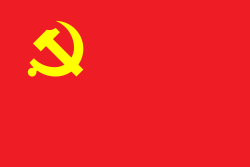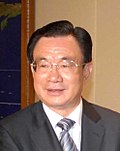| Secretary of the Central Commission for Discipline Inspection of the Communist Party of China | |
|---|---|
| 中国共产党中央纪律检查委员会书记 | |
 | |
 | |
| Central Commission for Discipline Inspection | |
| Status | Deputy national-level official |
| Residence | Zhongnanhai |
| Seat | Beijing |
| Appointer | Plenary session of the Central Commission for Discipline Inspection |
| Term length | Five years |
| Inaugural holder | Wang Hebo |
| Formation | 9 May 1927 |
The secretary of the Central Commission for Discipline Inspection (CCDI) is the head of the aforementioned body. The office is a leading political position, and the officeholder has been a member of the Politburo Standing Committee, the highest decision-making body of the Chinese Communist Party, since 19 September 1997. The current secretary is Li Xi, who was elected by the 1st Plenary Session of the 20th Central Commission for Discipline Inspection on 23 October 2022 and approved by the 20th Central Committee on the same day. The role is roughly analogous to that of the chairman of the Central Control Commission in other communist countries.
Contents
An ad-hoc Central Control Committee was established by the 7th National Congress in 1945, but the 7th Central Committee never elected it.[ citation needed ]










